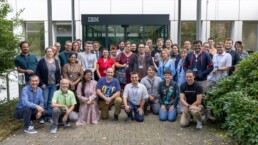What does Informatics Europe stand for?
Informatics Europe is an association dedicated to uniting and empowering the Informatics education and research community across Europe. Following the collaborative traditions of other established disciplines, Informatics Europe brings together university departments, faculties and schools, along with public and private research labs in Informatics and national Informatics associations, to foster excellence and innovation in Informatics research and education.
Since 2006, Informatics Europe offers an arena for strategic discussion, collaboration, and action on Informatics and its societal impact. It also provides services to help member institutions and the Informatics community enhance international visibility, refine policies, and advance strategic planning and research development. The collaborative work of the approximately 200 IE member institutions across 30+ countries delivers a wide range of outcomes, including policy recommendations, best practice guides, reports, training schools, and academic leadership development programs. The association is currently focused on activities related to Informatics Education Research and Education at schools, Diversity and Inclusion, Ethics, Green ICT, Research Evaluation, Interdisciplinarity and Higher Education Data.
Initiatives and reports on Informatics education in schools
Informatics Europe, in partnership with ACM Europe, has been proactively advancing Informatics education in schools since 2012. The first landmark achievement was the 2013 report “Informatics Education: Europe Cannot Afford to Miss the Boat”. To build on this work, the Committee on European Computing Education (CECE) was established in 2014 to study the state of Informatics education across Europe. This work led to the report Informatics Education in Europe: Are We All in the Same Boat?, accompanied by an interactive map at cece-map.informatics-europe.org for a visual exploration of the findings.
Informatics Europe co-found the Informatics for All initiative in 2017, which unites academia, industry, government and society to influence European policies toward the full recognition and establishment of Informatics as a core school discipline. The initiative has been a key driver in advancing Informatics education and played a central role in the development of the Informatics Reference Framework for School, published in 2022. This groundbreaking framework, supported by the “Designing and Implementing a Concrete Informatics Curriculum for School” document, sets the standard for integrating Informatics into school curricula, equipping students with vital skills such as problem-solving and logical reasoning, indispensable across disciplines for the digital age.
The Eurydice Report: “Informatics Education at School in Europe”, featuring Prof. Enrico Nardelli, former IE President and IE representative at the Informatics for All initiative, as its Scientific Expert, provides a comprehensive analysis of Informatics education across 37 European countries (39 education systems). Published in October 2022, the report analyzes how Informatics is taught—either as a separate subject or integrated into others—across primary and secondary education in 2020/2021. It covers key learning outcomes, teacher qualifications, and available training and support measures for Informatics educators.
Looking ahead: SVIA and Informatics Europe empowering Informatics education
Informatics Europe envisions a future where Informatics education is universally accessible and empowering. As an associated member of Informatics Europe, SVIA will remain committed to representing its members and amplifying the ideas and perspectives of school teachers in broader European and global discussions.
Gabriel Parriaux attending ECSS 2022 in Hamburg – Informatics Europe’s annual European Informatics Leaders Summit.
Inclusion4EU workshop at ECSS 2024: evaluating assistive technology devices for students.
2024 Summer School on Informatics Education Research
Das könnte Sie auch interessieren
Der SVIA-Vorstand im Porträt
Jean-Philippe engagiert sich im Vorstand der SSIE, weil er sich für den Informatikunterricht auf gesamtschweizerischer Ebene starkmachen möchte. Im Interview spricht er über die Bedeutung…
Le comité de la SSIE en portrait
Jean-Philippe s’engage au sein du comité de la SSIE pour contribuer activement à l’enseignement de l’informatique à l’échelle nationale. Dans cet entretien, il partage sa vision d’une politique…
Mit Herzblut für Bildung und Informatik
An der SVIA-Generalversammlung vom 19. November 2025 in Bern-Wankdorf konnten wir die neue Geschäftsführerin, Dr. Sarah Beyeler, begrüssen. Damit beginnt für den SVIA ein neues Kapitel. Wir freuen…
Elf Jahre, ein Biber und viele Algorithmen
Als ich 2014 die Geschäftsleitung des SVIA übernahm, war Informatik in der Schule noch ein zartes Pflänzchen. Die Diskussion, ob es überhaupt Teil der Allgemeinbildung sein soll, stand erst am…







